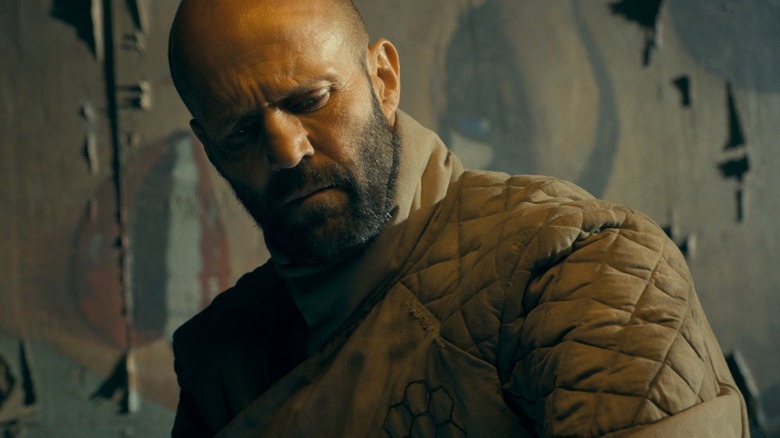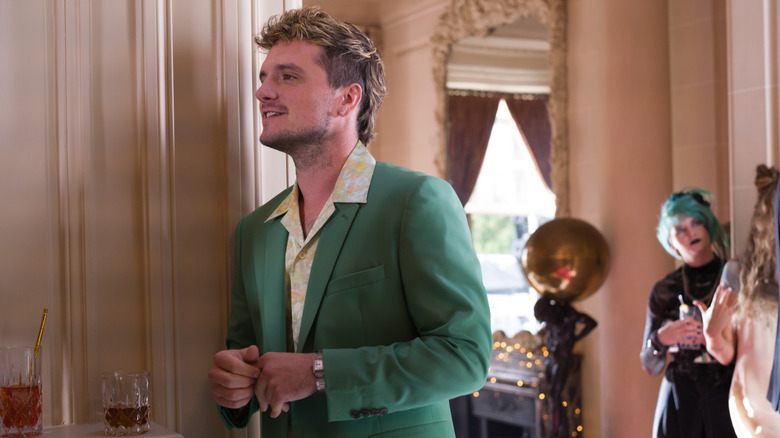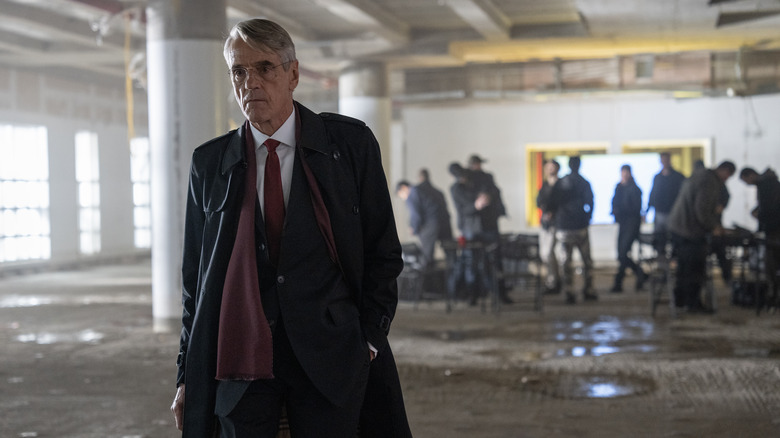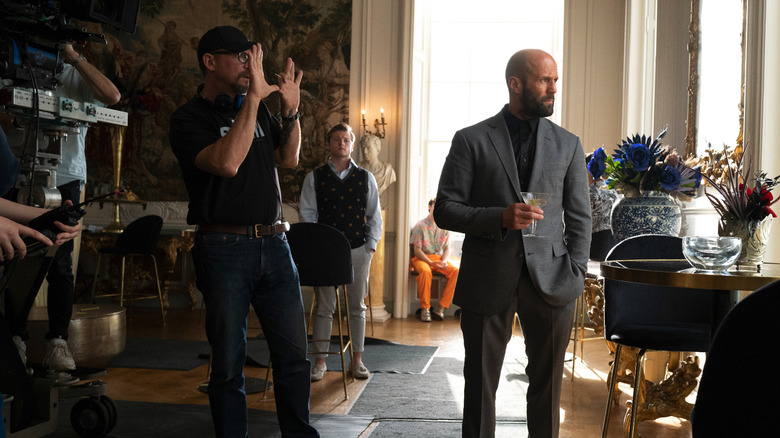The Beekeeper Review: Jason Statham Stars In His Own Version Of John Wick (But Not As Good)
Chad Stahelski and David Leitch's 2014 film "John Wick" instantly became totemic, casting a long shadow and impacting the way action filmmakers approached their craft. Over the past decade, we've seen the American action movie conform to that style, favoring hard-hitting hand-to-hand combat, more visually dynamic fight choreography, and longer shots that better highlight the action taking place (contrasted with the edit-a-fight-to-bits approach of Paul Greengrass's acolytes from the prior generation). "The Beekeeper," written by genre stalwart Kurt Wimmer ("Equilibrium," "Law Abiding Citizen," "Salt") and directed by David Ayer ("End of Watch," "Fury"), adopts those elements as well — but it goes a step further than most "Wick" riffs and incorporates what really makes that franchise stand out: world-building. There's a unique mythology at play here, elevating the movie to a heightened reality beyond our own.
Meet Adam Clay, a current beekeeper (and former Beekeeper)
Jason Statham plays Adam Clay, a stoic, solitary man currently renting space in the barn of Eloise Parker (Phylicia Rashad), who lives in an idyllic country farmhouse in the middle of nowhere. He keeps bees on the property, making honey and protecting the hive from invading hornets. Clay tells Eloise how appreciative he is that she's taken care of him and cared about him, and he whips up a jar of honey just for her. While he's off making the gift, Eloise falls prey to a computer scam led by "Wolf of Wall Street" wannabe scumbags who wipe out every bank account she has — including a charity fund for children that had over $2 million in it. When Clay walks over to her house to drop off the honey jar, he finds that Eloise has died by suicide.
Her FBI agent daughter (Emmy Raver-Lampman) eventually tells Clay that the feds have no leads, and here's where the "John Wick" influences start to become clear: Clay is not only a literal beekeeper, but he's also a former member of a clandestine government agency called the Beekeepers, an off-the-books organization that operates outside the system and is tasked with "protecting the hive." Ostensibly, the Beekeepers' job is to keep the system functioning, but now that he's retired, Clay's definition has taken on a more personal complexion. Clay reaches into one of his beehives and (hilariously) pulls out a hidden special phone, which he uses to call his contacts at the agency, who easily do what the FBI cannot and track down the dirtbags who scammed Eloise out of her money. Armed with a location and a grudge, Clay goes on a rampage to get justice for Eloise. These morons messed with the wrong beekeeper.
A tale of two tones
Ayer is presented with a bit of a tonal challenge here: Dealing with a serious, relatable, understandable issue (swindling elderly people out of their money) while also untangling this somewhat goofy mythology about a secret task force. Surprisingly, I found the former to be the more effective of this two-pronged storytelling approach. There's something viscerally upsetting about seeing unsuspecting people get bilked out of everything they've spent their life working for, Rashad plays her scenes perfectly, and the jerks doing the swindling are (purposefully) among the most annoying characters who will appear in movies this year: obnoxious, "Wolf of Wall Street" wannabes who celebrate in their garish call center after they've hoodwinked another target. This version of these villains is over the top, but there's something real underneath it.
Josh Hutcherson plays Derek Danforth, the heir to a major American company who, in the wake of his father's death before the film begins, sets up a slew of those call centers around the country. Hutcherson, who is typically a vaguely charming (if often a little boring) presence on screen, is playing way against type as an ultra-rich tech bro with no moral compass, and in a movie this heightened, he finds the right groove for how awful his character is supposed to be. (A scene where he corners a woman at a party and talks her ear off about NFTs is a bit hacky, but good shorthand for the type of dude this is.) Jeremy Irons lends some gravitas as Wallace, a former CIA operative who now runs security for the Danforths and has the unenviable job of keeping the brazen Derek out of jail and out of the tabloids. When Wallace finds out Adam Clay is hunting his way up the chain toward Derek, Irons gravely intones about the history of the Beekeepers, making some very silly exposition a little easier to swallow.
World-building is harder than it looks
Speaking of the Beekeepers, this was the part of the movie I was most interested to see expanded on after I saw the trailer. The mythology of "John Wick" is expansive, but relatively simple: There's a shadowy world of assassins who have their own set of rules and currency, but mostly, that world operates as a sort of sub-society to the rest of the world, and rarely the twain shall meet. Here, the mythology is a bit more muddled.
For one thing, there's a group of operatives at computers who answer Clay's call early in the movie and provide him with key information, but technically, they don't seem to be Beekeepers. Apparently, only one person can be designated as the Beekeeper, but when the current Beekeeper is sent to dispatch Adam Clay and Clay easily takes them out, we never find out what that really means for the structure of the organization. Is there another Beekeeper in line to take their place? Another oddity: The Beekeepers' mantras and tactical plans are modeled after the behavior of actual bees, but as the film goes on, the metaphor grows more and more strained as characters seem less like they're making human decisions and more like they're simply following a certain pattern of behavior because that's kind of like what bees do. (There are a few entertainingly ludicrous one-liners, which at least confirm the filmmakers know all of this is pretty zany.)
Minnie Driver briefly shows up playing an old colleague of Jeremy Irons' character, and she seems to know a little about the Beekeepers but doesn't appear to be actually affiliated with that group, which calls its grand secrecy into question. I love the idea of investing screen time into all of this world-building, I just wish the movie could have thought things out a little more and provided more clarity about it. I had a few moments of thinking, "Hell yeah, this is silly and fun," but ultimately, I ended up with more confused reactions about how all of this is supposed to work. That's the downside of introducing a mythology that integrates with real-world institutions instead of one that's siloed off in its own sub-society, like the "John Wick" movies.
The action scenes can be surprisingly brutal
Ayer, a filmmaker who always infuses his movies with heavily masculine energy, is a solid fit to direct a Statham vehicle. His no-nonsense approach to the action scenes makes them clearly visible (non-action junkies may be surprised how much this isn't a given in this genre), and the visual palette, shot by "Blade II" cinematographer Gabriel Beristain and costume designed by "Venom" alum Kelli Jones, surrounds the villains in gaudy neons and wraps them in wildly tacky costumes. Statham is ultra-stoic, but credible and entertaining, as always — he's completely in the pocket here, not doing anything new or boundary-breaking. The thing that separates this from a typical Statham actioner is the intensity of the violence. Characters meet especially brutal ends and are subjected to a number of over-the-top injuries. There's a severity on display that goes beyond just kicking a guy in the head, and Ayer's predilection for gritty filmmaking leads to some particularly memorable moments.
But the movie's handful of narrative stumbles are enough to take some of the sheen off its action scenes, quickly swinging the mood from high to low like the realization that the parents are on the way home during a teen movie house party scene. Aw man, this isn't as fun anymore. Eloise's FBI agent daughter and her partner (Bobby Naderi, presumably cast because Benjamin Bratt was busy) clumsily track Clay's rampage across the country, delivering more exposition and ineffectually trying to interrupt his vengeance. As the movie headed to its final locale, a mansion on the shore where a giant party was being thrown, questions began to mount in my mind until the film finally collapsed under the weight of its own ridiculousness — and not in a fun way. I didn't want to spend time wondering why the journalists in this fictional world are apparently awful at their jobs, but the movie left me no choice. Without giving away any plot points, a key character's motivations seem murky at best and some spectacularly erratic decision-making feels like it comes out of nowhere, which lets the air out of the balloon as the film sputters across the finish line.
Still, there are plenty of enjoyable moments here, and audiences who want nothing more than a Jason Statham beat-'em-up will surely be satisfied. But this movie's narrative and creative stumbles put into stark relief what we've known for 10 years now: The "John Wick" formula might seem easy to replicate, but to make an equally legendary action film is much, much harder than it looks.
/Film Rating: 6.5 out of 10
"The Beekeeper" hits theaters on January 12, 2024.




